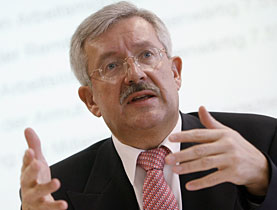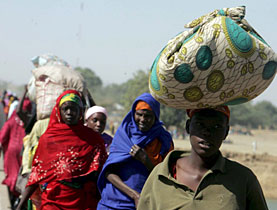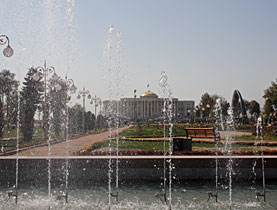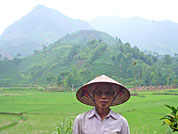Aid agency pledges flexibility to tackle crisis

Swiss aid will have to adapt to urgent needs in developing countries hit by the global financial crisis, according to the foreign ministry's development aid unit.
But its top official says that Switzerland is ready to tackle the challenges through increased international cooperation and to continue its programmes in the developing world and emerging countries.
Martin Dahinden, head of the Swiss Agency for Development and Cooperation (SDC) admitted that the SDC’s annual budget of SFr1.5 billion ($1.3 billion) and its institutional activities might be no more than a drop in the bucket compared with the needs.
“We can’t change the overall picture, but we can make a useful contribution,” he told the agency’s annual media conference on Wednesday.
He said Switzerland could adapt its programmes and seek to influence multilateral aid on an international level.
“On a country level we can try to support good governance policies and improve living conditions of the poor with specific projects.”
Poverty and hunger
Dahinden singled out the case of Bolivia, a priority country for Swiss aid for 40 years.
“We will very much focus on development in rural areas, where most Bolivians live, since farmers are probably most affected by the crisis,” he explained.
This does not mean a review of the basic strategy of SDC programmes in the Latin American country.
“We have always invested in projects in rural areas and stressed the importance of a multi-functional agriculture,” said Edita Vokral, head of regional cooperation.
Bolivia’s economic growth rate is likely to slow to two per this year cent, down from 6.5 per cent in 2008 and the amount of money sent back home by Bolivians working abroad is set to decrease dramatically.
It is estimated that these remittances add up to twice the amount of international development aid received by Bolivia.
Dahinden said the agency would follow closely the impact of the financial crisis in Asia to adapt existing programmes and focus on combating poverty rather than providing assistance for economic transition.
He said there were concerns that the successful Swiss aid in the region of the past few years could be affected adversely by the fallout from the crisis.
Developing countries still suffer from a food shortage as a result of mono-cultural agriculture, hr pointed out.
“It may no longer make the news headlines, but many people in countries of the south haven’t got enough to eat.”
Challenges
For Dahinden, the current situation also offers new possibilities, despite the difficulties.
“It is not just doom and gloom,” he said.
He pointed to a new drive to for sustainable development at a time of economic and environmental crisis, known as the New Green Deal.
Dahinden is confident that the new United States administration will support multilateral initiatives and cooperation.
He also called for pressing ahead with reforms of the United Nations and launching a improved financial system.
However, the economic crisis is having a number of knock-on effects. Planned investments in developing countries are being withdrawn and conditions for commodity exports have worsened. People who have been earning money abroad will not only be sending less money back to their families, but in many cases will return home themselves and be unable to find work, according to Dahinden.
“As a result of the crisis it is increasingly difficult for developing countries to have access to private credits. Exports and revenue from tourism are expected to slow down,” he added.
Dahinden also highlighted an expected drop in donations for non-governmental aid organisations, although funding of official programmes appears not to be affected as yet.
“The budgets were decided before the impact of the crisis was visible.”
The Swiss parliament last year agreed in principle to a gradual increase of official development aid to bring it up to 0.5 per cent of Gross Domestic Product. It currently stands at 0.4 per cent.
swissinfo, Urs Geiser
Swiss development aid makes up 0.4% of GDP – short of the UN Millennium Goal of 0.7%.
Parliament last year decided in principle to gradually increase aid to 0.5% by 2015.
The SDC has a staff of about 600 people in Switzerland and abroad. It has also employs about 1,000 locals and has an annual budget is about SFr1.5 billion.
Together with the funds by the State Secretariat for Economic Affairs (Seco) official development aid amounted to about SFr2 billion last year.
40% of the funds goes towards multilateral aid, including UN agencies.
Last year NGOs contributed a further SFr500 million.
The SDC has launched the second phase of its reorganisation, aimed at increasing efficiency in relations between headquarters and the cooperation offices in the field.
In a first step management at the Bern headquarters was reorganised. Some 340 employees were given new job descriptions and about 700 dossiers were examined.
Last year the SDC announced it was reducing the number of priority countries and regions benefiting from assistance from 17 to 12.
The new mandate followed a decision by parliament to make Swiss development aid more efficient.

In compliance with the JTI standards
More: SWI swissinfo.ch certified by the Journalism Trust Initiative





You can find an overview of ongoing debates with our journalists here . Please join us!
If you want to start a conversation about a topic raised in this article or want to report factual errors, email us at english@swissinfo.ch.